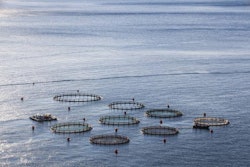Hamlet Protein, market leader in soy-based specialty proteins for young animals, co-hosted two technical seminars in Vietnam. Industry professionals, government delegates and academia engaged in interactive discussions on replacing animal protein in piglet feed by highly digestible vegetable protein.
Together with its local distributor Jebsen and Jessen, Hamlet Protein hosted the seminars in Hanoi and Ho Chi Minh City. Participants discussed on how meat and bone meal use in animal feed is one of the reasons behind the rapid spread of diseases such as African swine fever (ASF).
“The technical seminars we hosted in Vietnam form part of our ‘Feed Your Brain’ series of events. We aim to directly engage with customers all over the world to learn about the challenges they face in their markets and see how our product portfolio can provide health and nutrition solutions to them,” commented Hamlet Protein CEO Erik Visser.
Vietnam is one of the world’s top 10 pork consuming countries and stands second in Asia only to China. Like China, Vietnam is dealing with the impact of ASF at a time where the use of antibiotics is being restricted. That forces producers to critically review farm management and feeding procedures. In that review producers are looking for other protein sources than the commonly used of animal protein, as nutritionists recognize the ASF risk animal protein use brings.
Lars Andersen, Hamlet Protein nutritionist, presented valuable insight on the elevated risk of using feed ingredient with possible contamination by pathogenesis organisms. Andersen also recommended nutritionists to look at the non-protein nitrogen (NPN) data when formulating for piglets. “Considering the risk of using animal protein, their increasing prices and high NPN values, producers should consider the use of highly digestible vegetable protein, such as enzyme-treated soy protein,” stated Andersen.
Andersen also provided suggestions on formulation basics, when the use of AGP and ZnO is being restricted or banned. Showing data of various trials, Andersen highlighted how a careful selection of protein sources in the piglet diets can strongly impact the efficacy of diets. “In Europe we have been working with a restriction on AGP use for many years and are currently facing a ban on ZnO as well. At Hamlet Protein we have developed a range of products that can provide practical solutions that work for producers when formulating with these restrictions,” concluded Andersen.









